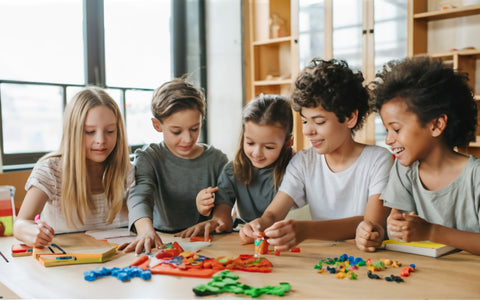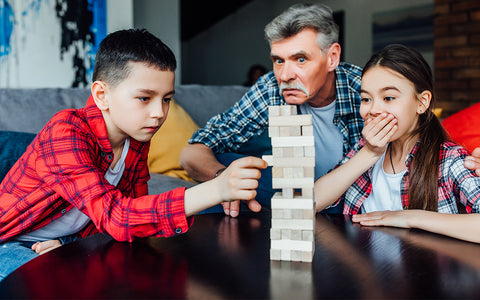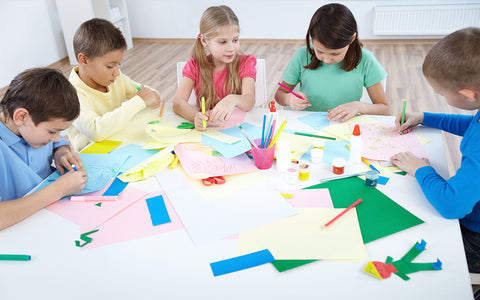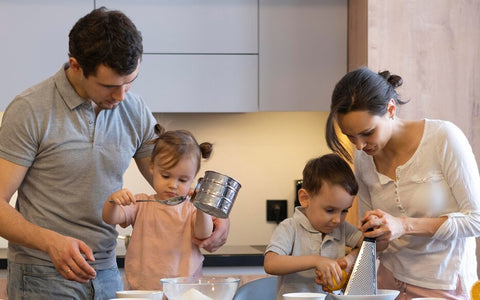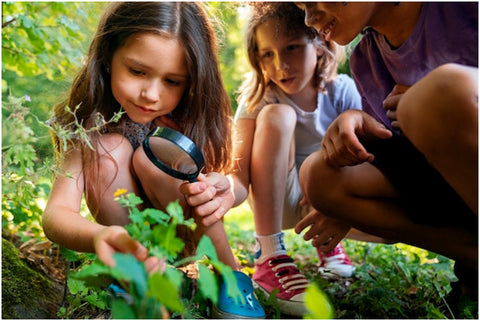## Introduction: Importance of Keeping Kids Engaged at Home
As parents, we understand the importance of keeping our children engaged and entertained, especially when they are spending more time at home. Engaging activities not only keep them occupied but also provide valuable learning opportunities. In this article, I will share 10 exciting and educational activities that will keep your kids entertained and help them learn while having fun.
Fun and Educational Indoor Activities for Children
When it comes to keeping kids engaged at home, there are plenty of indoor activities that are both fun and educational. One option is to encourage imaginative play. Set up a pretend play area with costumes, props, and a designated space where children can create their own stories and characters. This not only stimulates their creativity but also enhances their language and social skills.
Another great activity is to organize a treasure hunt. Create clues and hide small prizes around the house for your children to find. This activity promotes problem-solving, critical thinking, and teamwork. You can also introduce board games that are age-appropriate and educational. Games like Scrabble, Chess, and Monopoly teach children important skills such as strategic thinking, vocabulary building, and math.
Learning at Home: Incorporating Educational Games
Learning at home can be made enjoyable by incorporating educational games into your child's routine. There are numerous educational websites and apps that offer interactive games covering a wide range of subjects. For example, math games can help improve numerical skills, while language games enhance vocabulary and reading comprehension.
Another way to make learning fun is by turning everyday activities into educational opportunities. For instance, during cooking sessions, involve your child in measuring ingredients, following recipes, and discussing the science behind cooking. This not only teaches them practical skills but also promotes curiosity and critical thinking.
Creative projects are a fantastic way to keep kids engaged and unleash their imagination. Set up a dedicated art corner where they can explore different art techniques and materials. Provide them with a variety of art supplies like paints, markers, colored pencils, and paper. Encourage them to create their own masterpieces or take inspiration from famous artists.
DIY crafts are another excellent option for creative projects. Engage your child in making homemade greeting cards, jewelry, or even building a birdhouse. These activities enhance fine motor skills, hand-eye coordination, and problem-solving abilities. You can find countless DIY craft ideas online that use recycled materials, making them both eco-friendly and budget-friendly.
Science Experiments for Kids
Science experiments are not only educational but also fascinating for children. You can conduct simple experiments at home using everyday materials. For example, make a volcano by combining baking soda and vinegar, or create a rainbow by refracting light through a glass of water. These experiments introduce children to scientific concepts in a hands-on and engaging way.
You can also find science experiment kits that provide step-by-step instructions and all the necessary materials. These kits cover a wide range of topics, from chemistry and physics to biology and astronomy. Performing science experiments helps develop critical thinking, observation, and problem-solving skills.
Reading Challenges for Children: Encouraging a Love for Books
Reading is a fundamental skill that opens doors to a world of knowledge and imagination. Encouraging a love for books in children is crucial for their intellectual and emotional development. One way to do this is by organizing reading challenges. Set goals for your child to read a certain number of books or complete a book series within a given time frame.
Create a cozy reading nook in your home with comfortable cushions and shelves filled with age-appropriate books. Make reading a daily habit by setting aside dedicated reading time. Take turns reading aloud with your child, discuss the stories, and ask questions to promote comprehension and critical thinking.
Cooking with Kids: Fun and Educational Kitchen Activities
Cooking with kids is a fun and educational activity that promotes a variety of skills. Involve your child in meal planning, grocery shopping, and food preparation. Let them measure ingredients, mix batter, and decorate cookies. Cooking teaches children about nutrition, following instructions, and kitchen safety.
You can also introduce cultural cuisines and explore different flavors together. Encourage your child to create their own recipes or modify existing ones. This fosters creativity, experimentation, and a sense of accomplishment. Plus, cooking together strengthens the bond between parents and children.
Nature Activities for Kids: Exploring the Great Outdoors at Home
Even if you don't have a backyard or access to a park, there are still plenty of nature activities you can do at home. Set up a mini-garden on your windowsill or balcony. Teach your child about plant care and responsibility by letting them water the plants and observe their growth. You can also grow herbs or vegetables that you can later use in your cooking activities.
Birdwatching is another exciting nature activity. Hang bird feeders or create a birdhouse in your yard or balcony. Observe and identify different bird species together using field guides or online resources. This activity promotes curiosity, observation skills, and appreciation for nature.
Puzzle Games and Brain Teasers for Children
Puzzle games and brain teasers are not only entertaining but also help develop problem-solving and critical thinking skills in children. Introduce age-appropriate puzzles and brain teasers that challenge your child's cognitive abilities. Jigsaw puzzles, crossword puzzles, Sudoku, and Rubik's cubes are excellent options.
You can also create your own brain teasers by coming up with riddles or logic puzzles. Solve them together and encourage your child to create their own to challenge you. These activities stimulate the brain, improve concentration, and enhance memory and logical reasoning abilities.
Music and Dance Activities for Kids: Encouraging Creativity and Self-Expression
Music and dance activities provide a creative outlet for children and encourage self-expression. Set up a dance corner where your child can freely move and groove to their favorite tunes. Encourage them to create their own dance routines or learn choreography from online tutorials.
Introduce musical instruments to your child. Start with simple ones like a recorder or a xylophone. Teach them basic notes and melodies, and let them explore their musical talent. Singing together and playing musical instruments enhances coordination, rhythm, and fosters a love for music.
Virtual Field Trips for Children: Exploring the World from Home
Virtual field trips are an excellent way to expose children to different cultures, historical sites, and natural wonders from the comfort of their own homes. Many museums, zoos, and national parks offer virtual tours and interactive exhibits. Take your child on a virtual tour of the Louvre in Paris, the Great Wall of China, or the African savannah.
Encourage your child to ask questions, take notes, and discuss their virtual adventures. This helps develop their knowledge, curiosity, and understanding of the world. Virtual field trips also provide valuable learning opportunities beyond what traditional textbooks can offer.
Gardening with Kids: Teaching Responsibility and Connecting with Nature
Gardening is a wonderful activity that teaches children responsibility and allows them to connect with nature. Start by letting your child choose and grow their own plants or flowers. Teach them about soil, sunlight, and watering requirements. Let them take charge of nurturing their plants and observing their growth.
Gardening also provides opportunities for sensory experiences. Let your child touch and smell different plants, taste herbs, and feel the texture of soil. This activity stimulates their senses, enhances fine motor skills, and fosters a sense of responsibility towards the environment.
Sensory Play Ideas for Young Children
For young children, sensory play is crucial for their cognitive, physical, and emotional development. Create sensory bins filled with various materials like rice, sand, water beads, or dried beans. Let your child explore these materials using their hands or simple tools like scoops and cups.
You can also engage in sensory play by setting up a water table outdoors or filling a bathtub with colored water and bath toys. Sensory play helps children develop fine motor skills, hand-eye coordination, and sensory processing abilities.
Conclusion: Keeping Kids Engaged and Learning at Home
Keeping children engaged at home is essential for their overall development and well-being. By incorporating fun and educational activities into their daily routine, we can ensure that they continue to learn and grow while having a great time. Whether it's through indoor games, creative projects, science experiments, or virtual field trips, there are endless opportunities to keep kids engaged and excited about learning. So, let's make the most of these activities and create a stimulating environment that nurtures their curiosity and creativity.
Encourage your child to choose one activity from this article that they are most excited about and plan a day to engage in it together. Make learning and fun a daily part of your child's routine!


